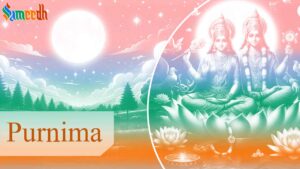“Purnima” (also spelled “Puranmashi”) is a Sanskrit term meaning “full moon.” In Hinduism and several other Indian religions and cultures, Purnima holds significant spiritual and religious significance. It occurs on the fifteenth day (Purnima Tithi) of the lunar month in the Hindu calendar, typically every month.

Purnima is considered auspicious for various religious activities, including fasting, performing rituals, and offering prayers to deities. Many festivals and celebrations are tied to specific Purnima days, such as Guru Purnima, Sharad Purnima, and Kartik Purnima, each of which holds its own significance and rituals.
The full moon is considered a time of heightened spiritual energy and clarity in many spiritual traditions. It is believed that during Purnima, spiritual practices such as meditation, chanting, and prayer are more potent and effective. Devotees often engage in these practices to deepen their spiritual connection and progress on their spiritual paths.
Vishnu is one of the principal deities worshipped on Purnima. Devotees also worship Goddess Lakshmi, seeking her blessings for wealth and prosperity. Devotees believe that conducting prayers, rituals, and fasts on these days pleases Vishnu, who is the preserver and protector in the Hindu pantheon. Several important festivals dedicated to Vishnu are observed on Purnima, such as Vaishakha Purnima (celebrated as Buddha Purnima, associated with the birth of Gautama Buddha, an incarnation of Vishnu) and Sharad Purnima, which marks the end of monsoon and the beginning of the harvest season, with rituals dedicated to Lord Vishnu.
The Satyanarayan Puja (Aarti), a ritual dedicated to Lord Vishnu in his form as Satyanarayan, is traditionally performed on Purnima. This practice is widespread and underscores the belief that full moon days enhance the efficacy of prayers and rituals dedicated to Vishnu.
Astrologically, Purnima holds significance as it marks the culmination of the lunar cycle. It is a time when the moon is at its brightest and fullest, symbolizing completion and fulfillment. Astrologers often analyze Purnima days for their potential impact on individual horoscopes and planetary alignments.
In the Hindu lunar calendar, each month typically has one Purnima, which marks the full moon day. Here are the names of the twelve Purnima or Pooranmashi occurring in a year:
- Chaitra Purnima
- Vaishakha Purnima
- Jyeshtha Purnima
- Ashadha Purnima
- Shravana Purnima
- Bhadrapada Purnima
- Ashwin Purnima
- Kartik Purnima
- Margashirsha Purnima
- Paush Purnima
- Magha Purnima
- Phalguna Purnima
Each of these Purnima days holds its own significance and may be associated with specific festivals, rituals, or observances in Hindu culture and tradition.
Purnima is considered auspicious for observing vows and fasting. Many devotees observe fasts on Purnima days as a form of spiritual discipline and purification. Fasting is believed to promote self-control, mindfulness, and spiritual growth.
During Purnima, devotees often gather at sacred sites, temples, or riverbanks to participate in rituals, ceremonies, and communal prayers. The full moon is also associated with increased spiritual energy and is believed to have a positive effect on meditation and spiritual practices.
The deity or spiritual figure worshipped on Purnima (full moon day) may vary depending on cultural, regional, and personal beliefs. In Hinduism, the deity worshipped on Purnima can differ based on the specific occasion or festival associated with that particular Purnima.
Here are some examples:
- Guru Purnima: On this day, devotees pay homage to their spiritual gurus or teachers, expressing gratitude and seeking blessings for spiritual guidance and enlightenment.
- Sharad Purnima: This day is dedicated to the worship of Goddess Lakshmi, the Hindu goddess of wealth and prosperity. It is believed that Goddess Lakshmi is particularly propitious on this day, and devotees seek her blessings for abundance and prosperity.
- Kartik Purnima: This Purnima is associated with various deities and rituals. It is commonly celebrated as the birthday of Lord Kartikey (also known as Skanda or Murugan), the son of Lord Shiv. Additionally, it is considered auspicious to perform rituals and take holy baths in sacred rivers on this day.
- Vat Purnima: In some regions, married Hindu women observe Vat Purnima Vrat (fast) for the well-being and longevity of their husbands. They worship the Banyan tree and tie threads around it, symbolizing the longevity of their marital bond.
- Ganesh Chaturthi Purnima: During the Ganesh Chaturthi festival, which culminates on Purnima, devotees worship Lord Ganesh, the elephant-headed god of wisdom and prosperity.
- Satyanarayan Purnima: This day is dedicated to the worship of Lord Vishnu, particularly in the form of Lord Satyanarayan. Devotees perform the Satyanarayan Puja, seeking blessings for prosperity, well-being, and spiritual fulfillment.
These are just a few examples, and there may be other specific Purnima observances dedicated to various deities or spiritual figures based on local traditions and customs. Overall, Purnima is considered an auspicious day for worship, prayers, and spiritual practices in Hinduism.
Overall, Purnima holds multifaceted significance encompassing religious, spiritual, astrological, cultural, and agricultural aspects. It is a time of reverence, reflection, and celebration for people across different traditions and communities.
